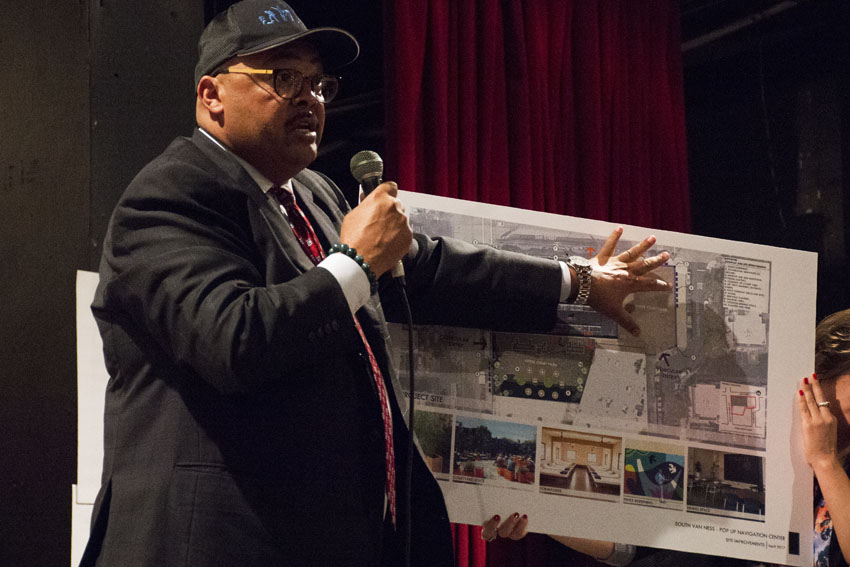This article is part of a project examining ways to use the ballot to hold local government accountable. It was supported by the Solutions Journalism Network’s Renewing Democracy program.
When it comes to good government, dysfunction and disgrace can occasionally inspire some of the brightest ideas for reform. And getting the whole community involved in the cleanup — through the ballot box — can be one way to make those changes happen faster.
Though the parallels are not exact, the tiny scandal-ridden city of Bell, near Los Angeles, could hold keys to fixing a culture of corruption that has insinuated itself deep in the heart of San Francisco’s massive and opaque bureaucracy.
Like Bell a decade ago, San Francisco has suffered ignominious episodes of public officials being charged with abusing their power for personal, political or organizational gain. Most recently, the Department of Public Works was rocked by an FBI investigation into alleged kickbacks, slush funds and illicit permitting influence, leading to the arrest and ouster of its director, Mohammed Nuru.
Listen to Max Pringle discuss Proposition B with Supervisor Matt Haney and Republican activist Larry Marso on “Civic.”
An investigation by the controller’s office found that lax oversight of the department had contributed to contracts frequently being handed to favored companies and friends of the director from a pool of pre-qualified candidates. Another probe from the city attorney charged more than a dozen people with corruption.
San Francisco reformers are now asking voters for solutions to the kinds of problems that can arise when one department head is responsible for multiple city functions and has no one to answer to.
“That kind of unchecked power never ends well,” said District 6 Supervisor Matt Haney. “Most other departments have a commission with some kind of a public process where they approve contracts. And the result of that was this individual who runs Public Works was able to be not just unaccountable, but literally corrupt.”
[See related coverage: “Elected Watchdogs in Scandal-Plagued Cities Show How SF Might Avert Future Corruption”]
Haney, backed by a majority on the Board of Supervisors, the local Democratic Party and allied politicians in Sacramento, is betting that voters can help make government work more transparent.
Enter Haney’s brainchild, Proposition B on the November 2020 local ballot. In addition to splitting the department into two, it would create additional oversight boards that proponents say would help root out corrupt practices by closely monitoring the use of public funds. The goal is to accelerate the healing and earn back public trust.
It took a complete overhaul of local government in Bell, population 35,000, to restore trust there. But it did so in just a handful of years, after voters approved city charter amendments that rebuilt the city’s governance from the ground up, showing quick reforms are possible when the electorate is engaged.
In 2010 a Los Angeles Times investigation found that Bell City Manager Robert Rizzo illegally raised property taxes and business licensing, sewage and trash collection fees to fund his own salary bump to about $800,000 (from just $72,000, when he was hired in 1993), without anyone looking over his shoulder. The mayor and five council members, all working part time, saw their salaries go up to more than $100,000. One key to their scheme: creating phony boards and commissions that rarely met to justify their outsize paydays.
The reform elements that most clearly turned Bell around, according to a 2018 analysis by the California Policy Center, were to increase public engagement and transparency by posting budgets, contracts and other records online and gathering hundreds of people to public oversight meetings. Bell voters approved the changes in 2012. Additional provisions included restricting salary increases and barring extra pay for service on boards and commissions.
In San Francisco, transparency is a central focus. Proposition B would go further than creating new oversight bodies. It would require an annual performance audit, as well as a cost and waste analysis to root out inefficiencies. Because the changes envisioned in the proposition would amend the city charter, it had to go directly to the voters.
Haney said the Department of Public Works has gone without proper oversight for years and spread corruption throughout local government. “It has been so corrupt that it has actually infected about three or four other departments in San Francisco,” He said, mentioning two in particular: Public Health and Building Inspection.
While it is hard to argue against accountability, building systems to bolster it does have a cost. If San Francisco approves its reforms, it will have to pay millions of dollars in its efforts to battle graft, and not everyone thinks that is a worthwhile trade.
Big-city blues: New Orleans voters clean up
Bell is not the only city that asked its citizens for help in watchdogging the government. In the long cleanup following the devastation from Hurricane Katrina in 2005, New Orleans’ former mayor, Ray Nagin, found himself embroiled in scandal. A judge sentenced Nagin to 10 years in prison on bribery and fraud charges after determining that he accepted $200,000 in payoffs from businesses in exchange for about $5 million in city contracts to help rebuild the city.
His successor, Mayor Mitch Landrieu, was elected based on his promises to clean up corruption. Under Landrieu’s voter-backed reforms, voters approved changes to the city charter in 2014 requiring a competitive bidding process. Most contracts must now be scored by a selection committee and be approved by the city’s chief administrative officer. Landrieu also appointed a chief procurement officer to oversee the process.
Since the reforms were enacted, New Orleans city government has managed to steer clear of major scandals.
California ballot measure led to sweeping reform
In 1974, following the Watergate scandal, the public was particularly attuned to government malfeasance. That was the year Californians approved Proposition 9, which created the Fair Political Practices Commission. Designed to counter the corrupting influence of big money in politics, the commission enforces spending limits on campaigns for statewide office, requirements for disclosure of lobbying activity and the ban on anonymous donations above $100.
The commission has been effective in curbing some of the biggest campaign finance abuses. In 2013, the commission won a settlement from two obscure Arizona-based political action committees linked to billionaire brothers and conservative donors Charles and David Koch.
The settlement disclosed that two groups funneled $11 million in donations through the California-based Small Business Action Committee to fight two ballot proposals. One would have increased taxes and another would have restricted unions’ political activity. The Commission learned the groups also funneled $4 million to another California PAC to support the anti-union measure. The Arizona groups, Americans for Responsible Leadership and Center to Protect Patient Rights, were ordered to pay $1 million in fines and release their donor lists.
The Fair Political Practices Commission could serve as a model at the state level for what Prop. B proponents are hoping to achieve in San Francisco by setting up independent commissions to watchdog the Department of Public Works and the proposed new Department of Streets and Sanitation. San Francisco voters have recently shown interest in ethics reform, specifically when it comes to conflicts of interest in elections. Last year they approved Proposition F, which strengthens the city’s campaign disclosure laws. It adds limited liability companies and limited liability partnerships to the list of businesses barred from contributing directly to campaigns. Corporations were already barred. The law also prohibits individuals and companies they control from contributing to campaigns for mayor, Board of Supervisors or city attorney if they have land-use business before the city.
Proposition B is not free
In most of the public discussion about this year’s Proposition B the oversight and transparency provisions have been overshadowed by the most complicated structural element of the plan: splitting the department in two, costing the city millions of dollars, with uncertain outcomes in terms of cleaning up streets or fixing ailing infrastructure. Not everyone is convinced that the measure is necessary either to maintain clean, safe streets or to promote transparency in government.
San Francisco tech entrepreneur Larry Marso is a delegate with the San Francisco Republican Party and the official opponent of Proposition B in this election’s ballot booklet. He mocks Haney’s efforts, saying “costly ‘commissions’ are not transparent superheros fighting fraud.” He asserts that rather than encourage citizen participation, creating “two new bureaucracies” will only further consolidate power into the hands of politicians who appoint their boards.
In an interview, Marso said the Board of Supervisors and City Administrator Naomi Kelly could meet to work out solutions for fighting corruption.
“I think her door is open,” Marso said.
Solutions to vexing problems like graft often cost money. And this year especially, it is money that some critics argue the city can’t spare.
This year the San Francisco Ethics Commission, the department charged with monitoring public officials, candidates and campaigns to prevent conflicts of interest, dodged a budgetary bullet in the months after the Nuru scandal broke. Mayor London Breed had signaled she intended 10% across-the-board department cuts in her annual budget proposal to help make up a projected $1.5 billion deficit resulting from the economic downturn in the wake of the COVID-19 pandemic. Breed later reduced that proposed cut to 3.3%.
Some ethics reformers say that the city should be spending more money to restore trust in government, not less.
“We do not have enough resources in general to monitor the performance and compliance with laws in many city departments and agencies,” said Larry Bush, a commission member.
Bush said the pandemic has made a bad financial situation worse. The commission is charged, for example, with auditing at least one lobbyist per year, but has not had the funding to hire staff to do so for five years.
But Proposition B critic Marso said this is the wrong time for the city to spend money on new agencies and commissions, as city agencies budget for COVID-19. The 2020-2021 city budget is $13.6 billion, which includes $14.7 million for COVID-19 response and $60 million for mental health services. “It is distasteful to be asking for more during the pandemic against the spirit of shared sacrifice,” he said.
Should the voters even be making these decisions?
Marso said long-standing societal problems have mixed with inefficiencies at City Hall to make it difficult to tackle knotty problems.
“The conditions in our streets result from deep fundamental flaws at City Hall,” Marso said. “San Francisco has become a canvas for some of the biggest problems of our time, the triad of mental illness, drug abuse and homelessness. I believe Proposition B is going to make everything worse and harder to get real reforms.”
The San Francisco Planning and Urban Research Association, or SPUR, also opposes Proposition B. It would create more expense with no guarantees that it would accomplish what backers say it would, the group argues.
“The city controller has estimated that once up and running, just like the back end of any agency that includes assistance from the Finance Department and contracting and legal review, Proposition B would add $2.5 million to $6 million per year to the city’s budget,” said SPUR analyst Eli Zigas. He said that overhauling existing Public Works management could achieve the same or better results, without the added cost.
SPUR does not oppose the creation of a new oversight commission, but points to the limitations of such a structure.
Zigas said the proposed reform would make the Department of Public Works function more like other agencies that have commissions that oversee them. “But we know the Department of Building Inspection has also had some corruption and mismanagement issues,” he said. “So a commission is no guarantee either of better performance or better management.”
In May, San Francisco City Attorney Dennis Herrera charged former Department of Building Inspection head Rodrigo Santos with redirecting nearly $500,000 in checks meant for the department to his own personal bank account.
SPUR cautions against using ballot measures to tackle problems elected representatives could solve on their own. “Many voters would say on many of the measures they receive, ‘You know, why am I voting on this? I just wish the people I vote for would solve it.’”
This article is part of a project examining ways to use the ballot to hold local government accountable. It was supported by the Solutions Journalism Network’s Renewing Democracy program.
In this series:
- With Corruption on the Ballot, San Francisco Could Learn Oversight From Other Scandal-Plagued Cities (article and radio episode on “Civic”)
- Using the Ballot to Fight Corruption (web event)
- Can the Ballot Be Used to Hold Local Government Accountable? (radio version of web event)








